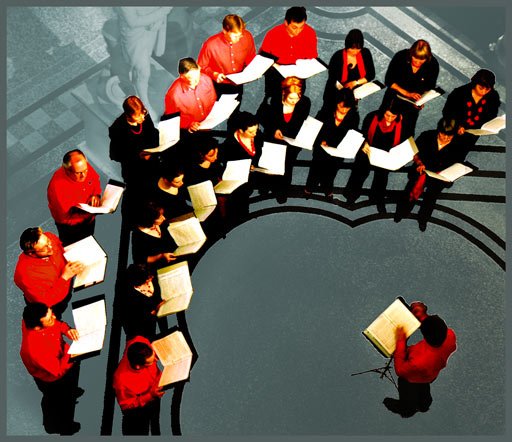In my manuscript books I have found the following from the early days (unfortunately mostly undated, or some post-dated when I started taking myself more seriously but not seriously enough to realise that guessed dates are perhaps worse than no dates at all):
- Summertime by George Gershwin (copyright holders please note – this was never performed; choirs please note – I wrote a much better arrangement last year for the Magpies and performed it with permission at the Columbus Arts Festival in June, on the Town Street bridge, in a stiff most unsummerly breeze)
- The Eriskay Love Lilt (dated 28/2/94 – probably reliably) – with another Rudsambee hallmark of using a basic blueprint for the harmonies and instructions about line-swapping in different verses.
- Southern French shepherds’ call from the Pyrenees. Unfortunately this has never been performed – it had too many parallel fourths and dissonant drone sections (not to mention lack of bar lines) for newcomers and I shelved it. But I still love it and it is exactly the sort of thing I now buy CDs of (I shall here promote the Nordic singer Lena Willemark).
- Bohemian melody from 1505: de corpore Christi . It’s marked ‘Wiora no. 41/1a’ and I think it came from a library collection edited by Wiora. Those who have sung Aurora rutilat would recognise some of the treatments I gave this melody!
- Eriskay Love Lilt again, this time titled ‘bassless variety’ – a reminder that in the early days a good bass was very hard to find. No different from today of course, but in a group of six or seven you’re more likely to have no basses than in a group of twelve.
- Fhir a bhata. One page is labelled ‘NOT THIS’ which I think means that this arrangement was fairly quickly superseded by a better one.
- Na’m biodh tri sgillin agam – Gaelic mouth music makes its first appearance.
- She moved through the fair. First page displays another Rudsambee feature of giving the men a basically instrumental drone line so they don’t have too much to do (sorry guys, you know how much I love you). But the second page has an arrangement with the melody in the tenor, with accompanying chords by the women and a smooth underlying bass part.
There then follows a rash of Gaelic music that I think we prepared for the 1994 North Fife Family Festival, which was run by someone Peter knew, in a picturesque village called Luthrie. I remember Matthew approaching the line of singers in mid-performance and attempting a rugby tackle on my knees, but we carried on.
- Bodachan ar-i-ar-o – mouth music (resurrected by Rudsambee in about 1999).
- Cadal chan faigh mi. This was an attempt to merge early music and Gaelic with a tune from a lovely collection Gair nan Clarsach or ‘The harp’s cry’ by Colm O Baoill (actually an anthology of 17th c. Gaelic poetry but with a number of tunes included).
- Cha b’e ‘n uiseag (with a note ‘can omit tenor part’!) – lively but we didn’t use it much after that festival.
- Chuala mi e
- Cearcall a chuain
That’s the end of the first manuscript book.
In another manuscript book, which carries a lot of 1996 dates, I found the following (note that we were using hardly any printed music, though I know we photocopied the odd round or two from Ravenscroft collections, for example):
- Body and soul – never used
- In dulci jubilo – a first go at the jazz version
- En etsi valtaa loistoa – realised from an edition for voice and guitar, so not authentic Sibelius but with a Sibelius quality. Sari must have joined the group by this point.
- Rainforest – words by Judith Wright. From the ‘Poems from the Underground’ collection.
- The winter it is past – a Robert Burns tune (post-dated 3/96)
- Sang – my first William Soutar setting (post-dated 4/96)
- Primera Pagina – my first Lorca setting.
There’s one other early manuscript book I can find, which reaches later, but just for completeness I’ll note what’s in that one:
- A song for England (words by Andrew Salkey, who has since died)
- The Ocean’s Sound – another piece from Gair nan Clarsach which I never completed
- C’est le vent du large qui chante – a French round brought to the group by Paul Carline
- Cota fad air Domnhull lom
- Tha bean agam
- A revised version of Chuala mi e
- ‘S ann an Ile
- I will give my love an apple
- Pokare kare
- Solar Creation – I wrote this setting of a poem by Charles Madge for my mother’s 60th birthday, and I think we tried it once, but it was too hard. It’s slightly Holstian, but awkward in places. It modulates from C to Db, which my uncle said you just can’t do, but I did.
- The Lyke Wake Dirge – trad. arr Phillips and Hill
- Day is dune – William Soutar
- Innocent’s song – words by Charles Causley. I remember we performed this at the Steiner School Christmas Fair (1997?) and I later found out that Ben Parry, who had just moved to Edinburgh and was there with friends from the SCO, asked who had written the arrangement! (I clutch at what straws I can)
